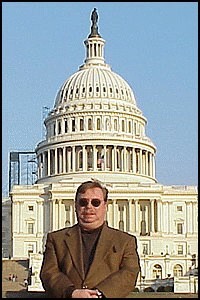Former Echelon agent warns Danish politicians against confidential conversations over the phone
|
The Echelon system not only listens in on private persons, companies and interest groups, Danish politicians and ministers are also the target of the NSA's extensive espionage, reveals Wayne Madsen to Ekstra Bladet, who meets him in Washington D.C.
Wayne Madsen was once a spy for the National Security Agency NSA - the intelligence service behind Echelon - but he has severed connections with his former employer.
We are crossing the border into the state of Maryland. Behind us lies Washington D.C., the US capital - and somewhere in front before us lies Fort Meade in neighbor-state Maryland. 'The Fort' is the headquarters for world-wide espionage and the workplace for 38,613 of the most talented secret agents in the world.
Wayne Madsen is very familiar with Fort Meade. For several years, it was his clandestine workplace. He has a pistol in the glove compartment of his car. Loaded. Wayne Madsen is always armed wherever he drives.
"I don't carry a gun because I think it's cool to have a pistol. But based on the sources I still have in the NSA, I know there are people in the intelligence services who do not care for people who talk about the secret services. Since they are armed, I had better be prepared, too."
Wayne Madsen is an experienced man in regards to secret projects and surveillance. Since 1975, he has been operating the most sophisticated computer technology in existence. First as a marine in the US Navy, then as an agent for the National Security Agency, NSA, and most recently as an employee at two of the NSA's partners, RCA and the Computer Science Corporation.
"Whenever anyone criticizes the NSA, it is important to remember that they have done a lot of important work, too. Both during the Second World War and the Cold War, when they were talented at breaking the codes of the Nazis and the East Bloc countries respectively."
TOTAL HEARABILITY
Just before we get to Fort Meade, Wayne Madsen points down an access road. "I went through a lie-detector test and a voice-test analysis over there, before I was approved by the NSA," Wayne tells us with a faint, shy smile.
He was a lieutenant in the Navy at the time with ten years of experience in tracking Soviet U-boats and monitoring computer security.
MINISTERS MONITORED
SPY TO EX-SPY
Inside the museum, Wayne Madsen asks whether Jack Ingram is at work today. A moment later, a tall man appears. Ingram has been an NSA spy for many years. Now he administrates the museum. He shakes hands with Wayne, and the pair quickly strike up a conversation about common acquaintances at various intelligence agencies and companies.
Shortly after, we walk around looking at the NSA's exhibits of cast-off super-computers and code deciphering equipment - debris from more than fifty years of intensive espionage in world-wide communication. Wayne Madsen continues:
"Denmark doesn't get very much out of being a third party, because NSA is the first party and decides which information the other countries receive. So obviously, whenever they monitor specific politicians or companies in a certain country, they naturally don't tell the local government about it. The information they give to Denmark is something that promotes their own interests or something they themselves consider to be a threat. For example something about Tamilians or the PKK, the Kurdish resistance movement. If it involves information which promotes their own financial interests, then naturally they use it for their own benefit."
As we drive back to Washington, he turns briefly toward Fort Meade's parabolic antennas with a serious look on his face:
"The problem is that the NSA has lost sight of its purpose. It's not right that taxpayers' money is used to help major shareholders in large corporations to earn huge profits. Or for that matter the fact that the NSA puts ordinary people, legal organizations and politicians under constant suspicion."
EXTRA FACTS
In a joint council in September, Minister for Defense Hans Hækkerup admitted that Denmark cooperates with other countries on surveillance. However, Hans Hækkerup would not reveal which countries and intelligence agencies Denmark cooperates with. It does appear, however, in the archives left behind by the former head of the Danish Defense Department's Intelligence Service, Commander Mørch.
Sources in Mørch's archives show that Denmark entered into an agreement with the US on surveillance cooperation all the way back in 1947 - the same year that the UKUSA - the pact behind Echelon - was established. The UKUSA pact is controlled by the National Security Agency in the US, in which the Australian, Canadian, New Zealand and British intelligence services participate as second-party partners. Most NATO countries - including Denmark - officially entered the pact as third-party partners in 1950. According to documents in the possession of Extra Bladet, the National Security Agency has now confirmed that it has third-party partners.
